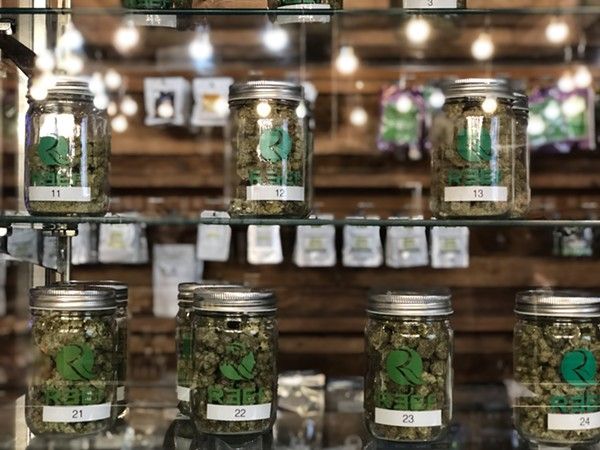How about a little trip in the 'way back machine?'  I loved this article; probably because I lived through these times and knew/know some of the players mentioned in the article. But for those of you who might wonder who John Sinclair is or why he is talked about so much in the legalization movement, this article may explain a few things.
I loved this article; probably because I lived through these times and knew/know some of the players mentioned in the article. But for those of you who might wonder who John Sinclair is or why he is talked about so much in the legalization movement, this article may explain a few things.
How Hippies Turned a College Town into 'The Dope Capital of the Midwest'
In the early 70s, far-left activists got the chance to govern Ann Arbor. The first thing they did was make weed essentially legal.
The series of events that would lead to the radical reform of Michigan’s cannabis laws, and the transformation of a college town into the most 420-friendly place in the country, began with two hippies, Louis and Peg, who turned out not to be hippies at all.
For four months starting in the fall of 1966, the pair had befriended members of the Trans-Love Energies collective, located at the Detroit Artists’ Workshop near Wayne State University. The building was a center of left-wing activism and agitational propaganda in the Motor City—home of the
Fifth Estate newspaper, the local office of the Committee to End the War in Vietnam, and the future rehearsal space for
revolutionary rock band the MC5. On January 24, 1967, police raided the building, looking for the property manager John Sinclair. “Peg,” to whom Sinclair had gifted two joints, was actually a Detroit Police officer named Jane Mumford Lovelace. “Louis” was not a candle maker, but her fellow cop Vahan Kapagian, who had grown his hair and beard out to blend in.
Police made more than 50 arrests, including Sinclair’s wife Leni, but Sinclair was the only one who faced serious charges after being let out on bail. A beat poet and obsessive of black jazz culture as well as a lefty agitator, Sinclair had
attracted attention from the Detroit Police “Red Squad,” which monitored left-wing groups. But in their attempt to take him down, which spawned a years-long legal battle, the cops helped turn him into an extremely of-his-time icon.
Today, legalization is regarded as a mainstream position, with even right-wing politicians like John Boehner
supporting the movementand joining the large multi-state operators now maneuvering to control the cannabis industry. Sinclair and his contemporaries helped create the conditions for that industry to exist, but they aren’t the ones best poised to profit off of it. One of Sinclair’s radical contemporaries, former Weather Underground leader Bill Ayers—who roomed with Sinclair’s fellow White Panther Milton “Skip” Taube at the University of Michigan—doesn’t think that Boehner should be able to jump to the front of the line.
“You know I heard an interview on the radio where they kept asking him, ‘Aren’t you sorry that a lot of people went to jail and lives were broken?’ He said, ‘No, because that’s the way I understood it then.’ Well that’s bullshit,” Ayers told VICE. “Legalizing marijuana needs to be part of something bigger. It has to include reparations, and that means accountability for the people that brought us to the catastrophic place we were. People like John Boehner.”
But Sinclair sees his side as having achieved victory in spite of those people. “They hate marijuana smokers. They used to put us in prison. Now the bulk of the population supports us, but they still haven’t adjusted to that. Pretty soon you won’t be able to get elected if you don’t support marijuana legalization,” the 77-year-old said. “It’s very satisfying to see the tables turned on these rotten, lying motherfuckers. All this horrible police state shit. It’s the fabric of daily life in America that we’ve got to rip apart and dispense of. That’s going to be the hard part, is picking this shit out of the culture and throwing it away.”
The pro-weed activists of Sinclair’s era won an important victory: Cannabis legalization has
swept through all regions of the country at this point. But their story also shows how difficult lasting change can be.
The MC5, John Sinclair (right) and their friends in 1967. Photo by Leni Sinclair/Michael Ochs Archive/Getty Images
Sinclair was once described by
Detroit Free Press as the city’s “head hippie,” a figure with “wild hair” and a “drooping mustache.” He was a radical, a member of a generation of pro-cannabis activists who saw the drug’s use as part of their resistance to capitalism and the state, and who sometimes made it the object of quasi-religious fervor. Sinclair saw weed as occupying a similar place as sex in Orwell’s
1984. It set teenagers’ basic desires in opposition with the capitalist establishment, and was a key weapon in the “total assault on the culture” the hippie movement was attempting.
But the strident anti-authoritarianism of the Detroit Artists Workshop—someone
hung a banner out of the window during the infamous 1967 riots reading “Burn Baby Burn”—led to what activists described as harassment from the police, and violence from those with anti-hippie sentiments. After a firebomb attack on the MC5 bus and a series of assaults on women in the group, Trans-Love Energies relocated to a house on Hill Street in Ann Arbor, near the University of Michigan.
It was there that John and Leni Sinclair left what was arguably their most enduring legacy, as part of a group of agitators who pushed the college town to adopt the most progressive pot policies in the country, making Ann Arbor, as the
New York Times put it years later, “the Dope Capital of the Midwest.” There, Trans-Love dreamed of building a revolutionary enclave like the Maoist cadres they admired. Unlike Detroit, Sinclair says now, the cops weren’t going to bust down too many doors. And crucially, it was largely white.
“In Ann Arbor it was all the children of rich people,” Sinclair said. “The police were really precisely geared to not cause trouble for them. They were going to have to be lawyers, and doctors, and shit. So we took advantage of that. That’s why we went there. Because they only had ten police cars.”
Like campuses across the country, Ann Arbor in 1968 was teeming with radical youth, but something in the Trans-Love formula was especially compelling. In the MC5, the collective found a bridge between their leftist ideology, Sinclair’s Beatnik reefer worship, and the emerging blue-collar rock scene in Detroit. The band would play to a young, suburban audience at Detroit’s Grande Ballroom, then return home to Ann Arbor to do free outdoor concerts. As the band’s manager, Sinclair arranged for the MC5 to perform outside of the Democratic National Convention in Chicago that August. They returned to form the White Panther Party—named after the Black Panther Party—and called in their
ten-point program for revolution through “rock 'n’ roll, dope, and fucking in the streets.”
The group even established a nonprofit ecclesiastical wing, the Church of Zenta, based around ritual use of weed and hallucinogens. “Zenta is the religion to end all religions,” Leni Sinclair said. “That’s how I look at it. Because it’s the only religion that says ‘yes’ where other religions say ‘no’ or ‘thou shalt not.’ Well hippies say ‘yes.’ Yes, smoke weed. Have sex. Be who you are... Anybody who smokes weed is a Zenta believer, whether they know the term or not."
In 1969, White Panther leaders, including Sinclair, were indicted on conspiracy charges related to a
string of bombings in Ann Arbor targeting buildings associated with the military and CIA. FBI Section Chief R.L. Shackelford called the White Panthers “potentially the largest and most dangerous of revolutionary organizations in the United States,” and the group was targeted for surveillance under the agency’s
COINTELPRO program. (The bombing case would go all the way to the US Supreme Court, which ruled that the government had
illegally wiretapped the WPP; the charges were
subsequently dropped.)
But the thing that drew the most controversy was Sinclair’s sentence, handed down in July 1969, for those two joints he gave the undercover cop: ten years in prison.
Bobby Seale (center) speaks at the John Sinclair Freedom Rally in 1972, flanked by bodyguards. Photo by Leni Sinclair/Getty
The disproportionate penalty made him a cause celebre, with leading figures on the left—from Black Panther Party founder Bobby Seale to John Lennon—coming to his defense. At the John Sinclair Freedom Rally in 1971, Lennon and Yoko Ono performed a new tune, “John Sinclair,” that distilled the case to a sound bite: “They gave him ten for two—what more can the bastards do?”
Days later, Sinclair was released on bond and his conviction was overturned the next year, when the Michigan Supreme Court declared the state’s cannabis laws unconstitutional. The landmark case reduced the penalty for “simple possession” to a misdemeanor, and brought the maximum sentence down from ten years to one. The maximum sentence for sale of pot was reduced from life to four years. On April 1, when the new regime came into effect, Sinclair’s supporters gathered on Ann Arbor campus to celebrate his victory. The party has been held every year since, in what is now known as the Ann Arbor Hash Bash festival.
“The atmosphere after John got out of jail was one of great expectations for the future,” Leni Sinclair said. “We were on the national stage and had pulled off a very successful John Sinclair Freedom Rally. That is, until the government stepped in and ordered John Lennon and Yoko Ono to be deported, and they had to break off all political activity. But until then it was a feeling of euphoria, of things are going to get better from now on.”
After John's release from prison, the Sinclairs became less combative, re-christening the White Panthers the Rainbow People’s Party (RPP) and getting involved in electoral politics. Forming a coalition with the progressive Human Rights Party, the group won two seats on the Ann Arbor City Council. The
New York Times noted the willingness of the new coalition to run against the local Democratic Party, rather than solicit its support, and attributed their success to grassroots campaigning and the ability to reach University of Michigan students. The
new council members were Jerry DeGrieck, a student himself, and Nancy Wechsler, a central committee member of the Rainbow People’s Party. Both Degrieck and Wechsler assumed office at just 22 years old, and would later come out, making them two of the first openly gay elected officials in American history.
The most radical thing the new council members did was pass a law reducing the penalty for cannabis possession to a mere $5, about $30 in today’s money. The
Times reported that campaigners had originally proposed a 25-cent fine, but compromised at $5 to cover administrative and court costs. Michigan State Police Director John Plants told the paper he would enforce state law in Ann Arbor, citing fears that the new law could transform surrounding Washtenaw County into a haven for drug trafficking. But the hippies celebrated.
“Because of state law, we couldn’t make marijuana legal within the city,” DeGrieck said. “So we did the next best thing.”
This made the city one of the first to treat possession as a civil infraction, like a parking violation. It marked a major shift across the country, and within a year
Oregon moved to adopt a similar law at the state level. Coverage of Ann Arbor in the
Times focused on the open consumption trend, with Sheriff Frederick Postill
describing more stringent state laws as “unenforceable” owing to the prevalence of weed use in the city. which Police Chief Walter Krasny
estimated at 1,000 pounds per week in 1972. “I guess, unfortunately, marijuana is becoming a part of our way of life,” Kransy told the
Times.
Sinclair served as chairman of the RPP, helping broker alliances with more moderate elements of the coalition, and found consensus around the $5 pot law, which the group saw as a challenge to the power of the county sheriff department. But when moderates within the HRP expressed reservations about taking on the sheriff in local elections, Sinclair led the Rainbow People’s exit from the group, a move he now says he regrets.
But for a time, Ann Arbor really was something of a hippie sanctuary. A system of parallel power structures grew out of Trans-Love commune, including a
securityforce, a drug
counseling service, and a vast alternative media network which printed pro-cannabis propaganda like Sinclair’s “
Marijuana Revolution,” which argued that drug prohibition had become one of the contradictions of capitalist society in the West, paving the way for post-scarcity communism.
“If the Democrats and Human Rights Party were in coalition we could pass anything, and we did,” Leni Sinclair said. “We appropriated money for a daycare center, a free clinic, a dental clinic, runaway children, a food coop, and for a community center, the People’s Ballroom. It was like utopia for a minute.”
At one point,
Ann Arbor Sun advertised
a mail-in contest where readers could win a pound of cannabis. The prize was presented by state representative and Democratic Socialists of America member
Perry Bullard.
“We lit a fire in Ann Arbor that lasted for a few years,” John said. “and made it a lot of fun.”
Republicans took back control of the city council in 1973, and pushed through a repeal of the $5 law. That didn’t end the battle, however. At a council hearing in July, the Rainbow People swarmed the meeting,
lighting joints in the council chambers. The following year, their Human Rights Party coalition brought the $5 pot law back as a
ballot measure to amend the city charter. Ann Arbor
voted to approve the measure in April of 1974, by a margin of 52-48. The law stayed in place until 1990, when the fine was raised to $25.
Left: Zenta letterhead designed by Gary Grimshaw. Right: a portrait of John Sinclair by Leni Sinclair/Michael Ochs Archive/Getty
The Sinclairs weren’t as successful in changing the laws beyond the Washtenaw County line, though they tried. Two efforts to legalize cannabis in Michigan failed in 1972 and 1974, when they couldn’t get enough petition signatures to appear on the ballot. In California, Leni sat on the board of directors for the nonprofit
Amorphia, and funded the organization’s Proposition 19, which would have decriminalized weed, by selling hemp-leaf rolling papers. The proposal was
defeated in 1972, receiving 33 percent of the vote. The couple returned to Detroit in the late 1970s, where Sinclair worked with the progressive Coleman Young administration to release the files of the anti-communist police unit that targeted him in the 60s. (The Sinclairs have since broken up.)
Michigan voters finally approved recreational pot in 2018, but it’s no longer regarded as a symbol of revolution. Instead, some now worry the cannabis industry is dominated by large companies and
white men. Canadian firm Acreage holdings, whose
executive board includes Boehner, has made a series of
multimillion-dollar investments in Michigan, and in April, the state legislature passed a
bill making it easier for large companies to acquire commercial licenses by limiting background checks on investors. In states like Massachusetts, which legalized cannabis in 2016, multi-state operators have managed to skirt regulations and position themselves to
effectively control the emerging market.
Cannabis has gone from being a sacrament in John Sinclair’s eyes to a medicine under the law to a valuable commodity, if one with sometimes uncertain legal status. One sign of the changing times is the effort to eliminate provisions of the Michigan Medical Marihuana Program which allow patients to sign their rights to grow up to 12 plants over to a caregiver, who can possess up to 72 plants in total. Those who want to
end the system say medical pot too often ends on the black market, and on May 2, they scored a major victory when a
state regulator decided that caregivers could no longer sell their product to dispensaries. But that program also provides patients like Sinclair direct access to affordable weed—he currently receives two free ounces per month—and he sees the plan to end it as a hostile takeover.
“They’re opposed to this law that the people enacted. So they try everything they can to fuck it up by getting rid of the caregivers,” Sinclair said. “It’s not only their goal but the goal of the big-time suppliers, and growers, and distributors that pay for the $150,000 licenses. They want to get rid of the caregivers because they’re competition. If you can’t get it from a caregiver you have to get it from them.”
Sinclair himself says has never made any real money from weed, despite lending his name to various cannabis businesses over the years. After the new law came into effect in 2018, it was
widely reported that Sinclair had partnered with a Detroit business to create Michigan’s first public lounge for recreational smokers. The deal soon fell apart, amid what Sinclair said was an attempt by the building’s owners to exploit his status as a cannabis celebrity. He currently survives on Social Security, and is in the process of signing all intellectual property rights over to the Amsterdam-based John Sinclair Foundation. “It’s in formation,” Sinclair said. “I’m trying to form a creative repository for everything I own, so that it will go down into history.”
Maintaining a firm grip on these rights is one of the ways icons like Tommy Chong and Willie Nelson have been able to cash in on their stoner status, launching their own lines of strains, glass pipes, and vape pens. But Sinclair seems to have no interest in capitalizing on legalization, even though his activism helped the country get here. After all these years, he professes not to care about money and property. “I don’t care anything about the industry,” he said. “I have no stake in the industry. I don’t care what they do. I just wanna get the weed.”


 Wasn't saying that you were saying, I was just saying.
Wasn't saying that you were saying, I was just saying. 


